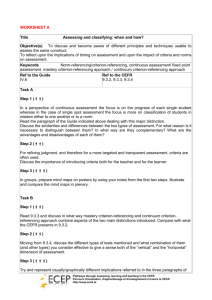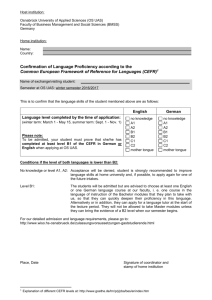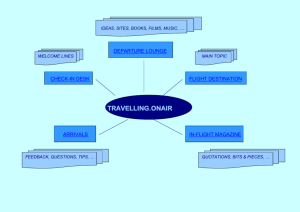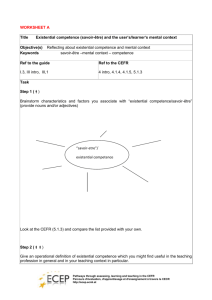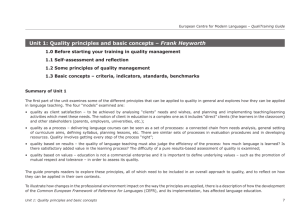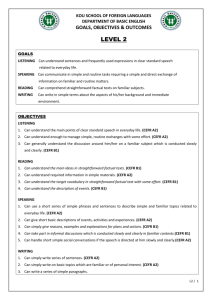So, how*s your English? - IS MU
advertisement
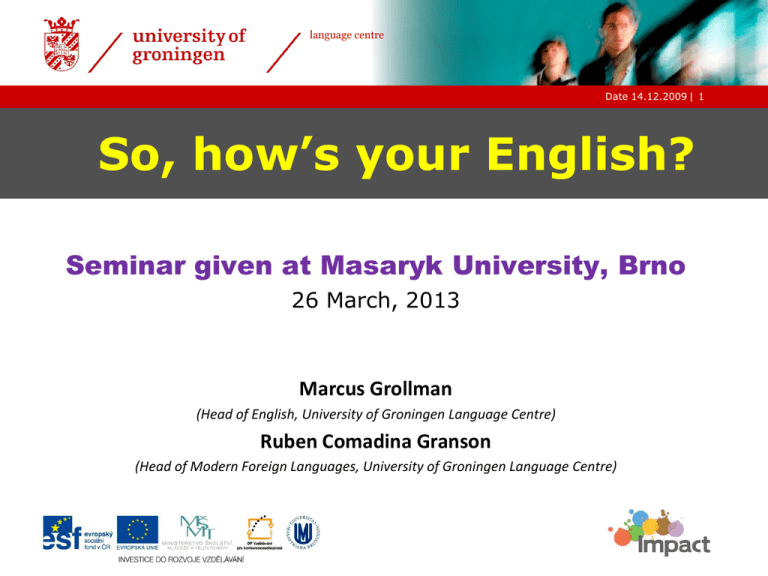
language centre Date 14.12.2009 | 1 So, how’s your English? Seminar given at Masaryk University, Brno 26 March, 2013 Marcus Grollman (Head of English, University of Groningen Language Centre) Ruben Comadina Granson (Head of Modern Foreign Languages, University of Groningen Language Centre) language centre Date 14.12.2009 | 2 Contents Introduction (CEFR, DIALANG) What we’ve experienced (“Dunglish”) and what you’ve experienced (“Czechlish”) A self-assessment activity Teaching: a real-life situation Peer-feedback: introduction … and now it’s your turn! (“pop-topics”) So where do we go from here? language centre Date 14.12.2009 | 3 Section 1 Introduction (CEFR, DIALANG) What we’ve experienced (“Dunglish”) and what you’ve experienced (“Czechlish”) language centre Date 14.12.2009 | University of Groningen By 2020, 20% graduates should have been mobile University of Groningen, Strategic Plan 2010-2015 Internationalisation = English-medium programmes Use of English as lingua franca “Passing from B2 to the C level should enable the learner to access higher education, professional fields of employment and the literary culture associated with a language.” (Green 2008) But what does this mean for lecturers? language centre Date 14.12.2009 | English in Int’l University Results: lecturers’ difficulty presenting content in EN frustration; however… native speaker? ability to compensate for language deficiencies with excellent didactic and presentation skills, as well as intercultural competences D level: “well-educated non-native speakers” (North 2010) language centre Date 14.12.2009 | A Good Lecturer Confident speaker of English Good fluency Excellent range of vocabulary (jargon) and good use of idiom Minor errors show that lecturer is not first language speaker but do not cause misunderstanding language centre Date 14.12.2009 | A Good Lecturer 2 May have a slight accent but does not detract from understanding except in exceptional circumstances, such as difficult combinations of sounds which a first language speaker might also trip over Self-corrects Makes good use of intonation, notably when giving examples Has combination of language, intercultural and pedagogical skills Is enthusiastic language centre Date 14.12.2009 | CEFR The Common European Framework of Reference for Languages (Council of Europe) A European Union Council Resolution recommended using the CEFR to set up systems of validation of language ability (2001) Framework of reference It describes language ability from A1 (basic user) up to C2 (proficient user) Can do statements: focusing on what a learner is able to do, not what a learner does wrong language centre Date 14.12.2009 | CEFR Encourages reflection Language Portfolio: Language passport Language biography Language dossier language centre Date 14.12.2009 | DIALANG It is a language diagnosis system It reports level of skill against the CEFR It is not an exam Five skills: reading, writing, listening, grammar and vocabulary Fourteen languages language centre Date 14.12.2009 | 11 DIALANG: First Screen language centre Date 14.12.2009 | DIALANG Feedback menu: Test results Check your answers Advice, e.g. B2>C1/C2 language centre Date 14.12.2009 | DIALANG: Reflection What levels do you have in Reading/Writing English according to DIALANG? What are your linguistic strengths and limitations according to DIALANG? To what extent does the feedback provided by DIALANG fit in with your image of your English language ability? What learning objectives do you set yourself in order to improve your reading, writing and listening? How will you achieve these objectives? talencentrum 28-01-2013 | 14 What We’ve experienced The issue of ”Dunglish” First Language Interference – FLI Circumlocution – “Why use 5 words when 1 would do?” MTV English v Formal English: range and coherence How do you do and how do you do your wife? How are you and how is your wife? When was the removal of Mr. Jansen to London? When did Mr. Jansen move to London? How well, having that said, the meeting is not for nothing • Although, having said that, the meeting was not a waste of time. I am the first woman state secretary for the inside and I am having my first period. I am the first female State Secretary for Internal Affairs and I’m in my first term of office. He had it not standing in his diarrhoea It wasn’t written in his diary. talencentrum 28-01-2013 | 20 Circumlocution o An electronical cupboard with a series of drawers to put your food in to make it cold o Refrigerator o The end of the night-time, just before the sun comes up o Dawn o The people who have come to watch the performance o Audience talencentrum 28-01-2013 | 21 “MTV” v Formal English › Language Culture › Text-speak › English as the International Language of Communication › Applied English talencentrum 28-01-2013 | 22 CEFR Criteria 1 - Range › B1 Has enough language to get by, with sufficient vocabulary to express him/herself with some circumlocutions on topics such as family, hobbies and interests, work, travel, and current events. › B2 Has a sufficient range of language to be able to give clear descriptions, express viewpoints on most general topics, using some complex sentence forms to do so. Language lacks, however, expressiveness and idiomaticity, and use of more complex forms is still stereotypic. › C1 Has a good command of a broad range of language allowing him/her to select a formulation to express him-/ herself clearly in an appropriate style on a wide range of general, academic, professional or leisure topics without having to restrict what he/she wants to say. The flexibility in style and tone is somewhat limited. talencentrum 28-01-2013 | 23 Informal to formal › about regarding / concerning › find out discover / ascertain › Lots of people think … It is widely believed / It is generally accepted talencentrum 28-01-2013 | 24 CEFR Criteria 2 - Coherence › B1 Can link a series of shorter discrete elements into a connected, linear sequence of points. › B2 Can use a limited number of cohesive devices to link his/her utterances into clear, coherent discourse, though there may be some "jumpiness" in a longer contribution. › C1 Can produce clear, smoothly flowing, well-structured speech, showing controlled use of organizational patterns, connectors and cohesive devices. talencentrum 28-01-2013 | 25 Transition language but nevertheless I’m going to start with I would like to begin with the following To finish with, I want to say again ….. In conclusion, I wish to reiterate ….. language centre Date 14.12.2009 | 26 “Czechlish” and its solution! language centre Date 14.12.2009 | 27 “Czechlish” and its solution! Pronunciation, e.g. bad/bed, thing/think, then/den Grammar, e.g. articles, pres simple vs. pres cont Vocabulary, e.g. meeting/appointment, factory/fabric Word order, e.g. I went by train to Prague Intonation, e.g. too flat Missing words, e.g. no subject SOLUTION: self-check error list (?) language centre Date 14.12.2009 | 28 Self-check Error List Editing symbol AWK Gr Gr Gr Gr Gr Gr Gr Gr Gr Gr Gr Inf P Sp W.O. W.W. á ? (pres simp/pres cont) (past simp/pres perf) (cond) (apost) (count?) (prep) (s/v agr) (gerund) (art) (adv) (T) (intro) Error Type Awkward structure – rewrite more simply Present simple or present continuous tense? Past simple or present perfect tense? Conditional - When/If? Apostrophe use Countable or uncountable? Preposition problem Make subject(s) agree with verb(s) -ing word form required Article problem – a(n), the Adverb not adjective required Make verb tenses consistent Informal style inappropriate Comma after introductory word or phrase Misspelling Review word order Wrong word Missing word Meaning unclear language centre Date 14.12.2009 | 29 Section 2 A self-assessment activity Teaching: a real-life situation The weather was terrible ever since we arrived last Friday. The weather has been terrible ever since we arrived last Friday. Do you mind telling me how old are you Do you mind telling me how old you are or Do you mind telling me, how old are you? Im very fond for cats, but unfortunately Im allergic for them. I’m very fond of cats, but unfortunately I’m allergic to them. Simon Brown a specialist in contemporary music was interviewed on the radio recently. Simon Brown, a specialist in contemporary music, was interviewed on the radio recently. When your on a plane, its important not to drink to much coffee. When you’re on a plane, it’s important not to drink too much coffee. I’ve had a cold for three weeks now and I can’t get rid of it. THE SENTENCE IS CORRECT As a child I would have a good memory but as I’m getting older it’s getting worse. As a child I had a good memory but as I’m getting older it’s getting worse. I’ll never forget to see the eclipse of the sun last year. I’ll never forget seeing the eclipse of the sun last year. I don’t have time to meet you today, but tomorrow is fine. THE SENTENCE IS CORRECT I’ve watched television since I’ve come home from work this evening. I’ve been watching television since I came home from work this evening. Try to be more careful! Thats the third time youv’e broken a cup. Try to be more careful! That’s the third time you’ve broken a cup. I was wondering why was he always late for work. I was wondering why he was always late for work. or I was wondering, why is he always late for work? If you aren’t very good at running, why don’t you concentrate on cycling instead? THE SENTENCE IS CORRECT All I want in life is a good health the happiness and a little money. All I want in life is good health, happiness and a little money. (first two articles are not needed) If I were you, go to the doctor immediately – that cut looks very deep. THE SENTENCE IS CORRECT But it could also be: If I were you, I would (or should) go to the doctor immediately – that cut looks very deep. If she hadn’t slept in she wouldn’t have missed her flight If she hadn’t slept in, she wouldn’t have missed her flight. Centuries ago, people would think the world was flat. Centuries ago, people thought the world was flat. My parents wouldn’t let me go to piano lessons, so I teached myself My parents wouldn’t let me go to piano lessons so I taught myself. (comma is optional) Why are you returning the milk to the shop? Do you think it’s off? THE SENTENCE IS CORRECT He’s been trying to break the world record four times but he’s always failing. He’s tried to break the world record four times but he’s always failed. language centre Date 14.12.2009 | 50 What do lecturers think is a good lesson? Clearly expressed instructional goals/objectives Well planned, paced and organized Clearly communicates to the students the desired outcomes Utilizes appropriate teaching and learning strategies Accommodates for different student learning styles Utilizes technology in a meaningful and competent manner Motivates and actively engages students to learn Periodically checks for student understanding Monitors and evaluates student performance Provides timely feedback to students Provides a summary of the lesson language centre Date 14.12.2009 | 51 What do students think is a good lesson? Knows what the lecturer is trying to accomplish in the lesson Understands what criteria the lecturer will use to assess them Knows how they are doing throughout the course Lecturers express their ideas clearly Content is easy to understand, or appropriate guidance is provided for complex and difficult tasks Course is well paced Lessons provide new and supportive content Content can be integrated with previously learned concepts Knowledge learned can help the students with future careers Is interesting, stimulating, challenging and motivating language centre Date 14.12.2009 | 52 A “real life” situation Watch this video fragment What examples of appropriate language did you notice – from the teacher or the students? How should the lecturer have dealt with students’ errors? What would you have done? language centre Date 14.12.2009 | 53 Section 3 Peer-feedback: introduction … and now it’s your turn! (“pop-topics”) So where do we go from here? language centre Date 14.12.2009 | 54 Peer feedback: an introduction Why peer feedback? Isn’t the teacher good enough? Categories Dare to be honest! Examples more than theories! talencentrum 28-01-2013 | 55 Objectives for peer feedback REMEMBER: peer feedback-giver is not a teacher or assessor. The feedback-giver is the audience: 2nd pair of eyes. Positive and constructive Understandable for student and teacher language centre Date 14.12.2009 | 56 … and now, it’s your turn! In small groups, you will give a ”presentation” (maximum 5 mins.), based on your “pop topic”. You have 20 minutes to prepare. Each member of the group must participate. You will receive peer feedback. Hodně stěstí! language centre Date 14.12.2009 | 57 Where do you go from here? Blackboard [Nestor] site AWL and Phrasebank Group “language buddies” Self-reflection language centre References Date 14.12.2009 | 58 Brawn, R. & Trahar S. (2003):Supporting in the learning teacher in changing higher education. In Sutherland, R. & Claxton, G. (Eds): Learning and teaching where worldviews meet. (pp. 245-254) Stoke on Trent: Trentham. Council of Europe. (2009). Relating language examinations to the Common European Framework of Reference for languages: learning, teaching, assessment (CEFR): A manual. Strasbourg: Language Policy Division. Fink, D. L. (2005). Integrated course design. Manhattan, KS: The IDEA Center. http://www.idea.ksu.edu/resources/papers.html Green, A. (2008): English Profile: functional progression in materials for ELT. Cambridge ESOL Research notes, Issue 33, 19-25. North, B. (2010). The Core Inventory (British Council seminar, 10 November, 2010). Retrieved April 24, 2012, from http://www.teachingenglish.org.uk/seminars/susan-sheehanbrian-north Wilkinson, R. (2005). The impact of language on teaching content: views from the content teacher. Retrieved April 24, 2012, from http://www.palmenia.helsinki.fi/congress/bilingual2005/presentations/wilkinson.pdf .
